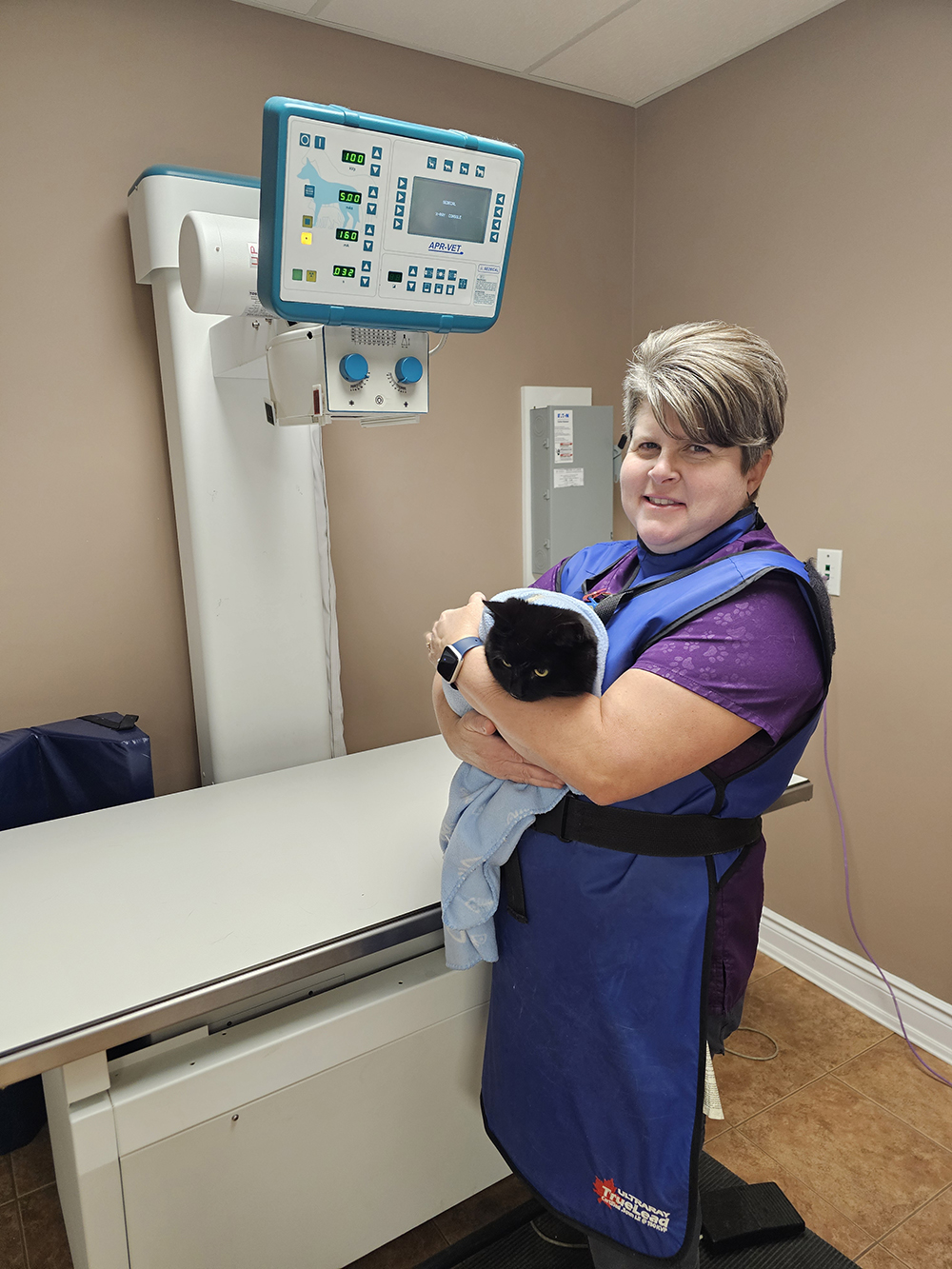Diagnostic Testing
We are equipped to handle a wide variety of medical conditions. Because we can perform many diagnostic procedures in-house, we can often give you immediate answers and start treating your pet faster. In some cases, your pet may require hospitalization and further diagnostic tests.

Please take a look at the more detailed descriptions of medical services we offer, or call us to be referred or transferred for your pet’s needs.
Laboratory Services
We have in house laboratory blood and urine testing equipment to meet the needs for same day results when indicated. We also work with commercial laboratories to provide services such as specialized blood testing, veterinary consultation regarding results, tissue biopsies and skin or urine cultures.
Bloodwork and urine tests (urinalysis)
Pets, like humans, can develop various health conditions such as kidney disease, liver disease, diabetes, thyroid disorders, and even cancer. These conditions may not show obvious symptoms in the early stages. Routine bloodwork and urinalysis can detect changes in organ function, blood sugar levels, and other markers that indicate developing health issues before symptoms become apparent.
Performing bloodwork and urinalysis early in your pet’s life establishes a baseline of what is normal for that individual. Subsequent tests can be compared to this baseline, helping us detect subtle changes that may indicate a problem.
Early detection bloodwork is a cornerstone of preventive care for your pet. Identifying health issues early allows for earlier intervention and treatment, potentially improving outcomes and quality of life for your pet. This may include dietary changes, medications, or other interventions aimed at managing or even reversing the condition.
By catching health issues early and implementing appropriate treatments, your pet can enjoy a longer, healthier life with improved overall well-being.
Fecal testing
Fecal testing is a diagnostic test performed to detect the presence of intestinal parasites such as worms (e.g., roundworms, hookworms) and protozoa (e.g., Giardia, coccidia). These parasites can cause various gastrointestinal issues and other health problems in pets and people.
The procedure involves collecting a small sample of feces from your pet, usually about the size of a tablespoon. The sample is sent to a veterinary laboratory for analysis. Some tests may also include additional methods like fecal flotation or fecal smears to identify specific types of parasites.
Fecal testing is recommended as part of a routine wellness exam for your pet, especially for puppies and kittens, who are more susceptible to parasites. For adult pets, annual fecal testing may be sufficient, but frequency can vary depending on the pet’s lifestyle (indoor vs outdoor) and other factors.
Early detection of intestinal parasites through fecal testing allows for prompt treatment, which can prevent further health complications for your pet and reduce the risk of transmission to other animals or humans.
Dermatology testing
Dermatology is the branch of medicine dealing with skin and ear diseases. Skin and ear diseases are frequently observed in dogs and cats. Diagnosing a skin problem in your pet may simply require an examination by a veterinarian; however, most skin diseases or ear problems require additional tests to accurately obtain a diagnosis and form a proper treatment plan.
Additional diagnostic procedures include skin and ear cytology, skin scrapings, fine needle aspirates of skin lesions or masses and skin or tissue biopsies.
Skin and ear cytology involves taking a sample of cells from the surface of the skin or from within the ear canal. This sample is examined under a microscope to identify the cells collected.
Skin scrapings are necessary to diagnose parasitic diseases like mange mites who live within the skin.
Fine needle aspirates or skin biopsies are used to diagnose the nature of skin lesions or masses and for diagnosis of autoimmune diseases.
The cause of skin problems ranges from hormonal disorders to the common flea. We recommend booking an appointment for your animal if you notice any excessive itchy behaviour, loss of hair, and / or the presence of scabs or scales on the skin.
We also provide referrals to a dermatologist when indicated such as for allergy testing and management.
Radiology
The common term for a radiograph is an x-ray. When your pet is being radiographed, an x-ray beam passes through the body and hits an x-ray sensitive plate to capture data, which is transferred on a computer. Images on the film appear as various shades of gray and reflect the anatomy of the animal. Bones, which absorb more x-rays, appear as light gray structures. Soft tissues, such as the lungs, absorb fewer x-rays and appear as dark gray structures.
Radiographs are used to provide valuable information about your pet’s bones and internal organs such as the heart, lungs, stomach, intestines, spleen, liver, kidneys, bladder, uterus and prostate. These images can help diagnose problems such as broken bones, joint swelling, heart failure, pneumonia, foreign bodies, masses, bladder or kidney stones. Our radiographs are reviewed by a board certified radiologist.
Ultrasound
Ultrasound imaging involves using sound waves to create images on a computer monitor.
An ultrasound is a noninvasive and non-painful way to see details of the soft tissues and organs inside the body and most animals do not require any sedation.
During an ultrasound, a probe is used over your pet’s body to transmit ultrasound waves through a gel and into the body. However, since pets have fur, the area examined by ultrasound will need to be shaved to allow application on a gel on the skin that is needed for the probe.
For non-urgent medical conditions that require an ultrasound, we offer the service by appointment with a mobile ultrasound specialist.
Contact us if you have any questions or require more information on our diagnostic testing.
